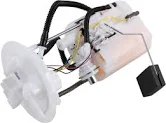Failing Fuel Pump Symptoms A fuel pump that has been failing will typically have more than just one symptom affecting vehicle performance. A most frequent source of the problem is represented by engine sputtering when driving at high speed. The engine needs a constant flow of fuel while driving at high speeds. If the fuel pump cannot maintain enough pressure, usually 35 to 65 PSI for most automobiles, it can result in erratic fuel delivery and engine sputtering or stalling. This problem is mostly predominant while accelerating the vehicle or even during highway driving.
Difficulty starting engine: This is another symptom of a failing fuel pump. It worked by pumping fuel from the storage tank into your engine. If it gets damaged, this could lead to not enough fuel being delivered and the engine may take longer than usual to start or maybe even have trouble turning on. Industry experts say 40% of fuel pump failures are going to come in the form of a starting issue, typically on older cars.
A decrease in power under load is among the more pronounced of these effects. Your car insists on a hill, your trailer or load equipment is full and the ride needs to be heavier? It may also depend on insufficient pressure of fuel delivered by the pump. The engine loses power due to the fact that it is being deprived of fuel which in return prevents it from keeping up with its performance. Engines will misfire or stall if they do not have the right pressure—50 to 65 PSI for most current vehicles—in place.

Another sign of a failing pump is engine misfires. What raises this misfire is that the fuel-to-air ratio in combustion chamber will be off-balance, which results from irregular delivery of the fuel. The above imbalance can naturally lead to poor idle condition or even stalling. In fact, car and driver reports engine misfires are one of the top 5 warnings of fuel problems. And a culprit... The Fuel Pump!
A fuel pump failure will also cause the check engine light to come on. There are many different engine performance problems that can cause this light including one related to fuel pressure. Common diagnostics will show a P0087 DTC of low fuel pressure in the system You should take this notice serious because you will need to repair the water pump as soon as possible, or it could cause major damage to your engine.
Another sign is if there are strange noises from the fuel tank. A properly functioning fuel pump emits a soft hum while running, however if the fuel pump is faulty it may emit loud whining or screeching noises. Usually this noise is caused by the wear on the internal part of the pump like its impeller and thereby now not be able perform as required. Although the average fuel pump is likely to last between 100,000 and 150,000 miles or so in this way sort of depends on contamination/debris inside your gas mixture.
If you see any of these signs then be sure to have your fuel systems checked. If let unpunished, a faulty pump can cause a complete failure. To find suitable replacements, check out our range of products that are designed for the perfect fit on your car at Fuel Pump.
